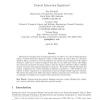67 search results - page 8 / 14 » Strengthened Security for Blind Signatures |
PPDP
2005
Springer
2005
Springer
A resolution strategy for verifying cryptographic protocols with CBC encryption and blind signatures
14 years 28 days ago
Formal methods have proved to be very useful for analyzing cryptographic protocols. However, most existing techniques apply to the case of abstract encryption schemes and pairing....
IEEEARES
2007
IEEE
14 years 1 months ago
2007
IEEE
Voter anonymity, also known as unlinkability, is the primary requirement to satisfy privacy in e-voting protocols. Up until now, e-voting protocols have tried to make communicatio...
ICISC
2001
13 years 8 months ago
2001
Motivated by emerging needs in online interactions, we define a new type of digital signature called a `Content Extraction Signature' (CES). A CES allows the owner, Bob, of a...
TCC
2010
Springer
14 years 4 months ago
2010
Springer
The strongest standard security notion for digital signature schemes is unforgeability under chosen message attacks. In practice, however, this notion can be insuļ¬cient due to ā...
ESORICS
2005
Springer
14 years 1 months ago
2005
Springer
Abstract. Formal methods have been extensively applied to the certiļ¬cation of cryptographic protocols. However, most of these works make the perfect cryptography assumption, i.e....

